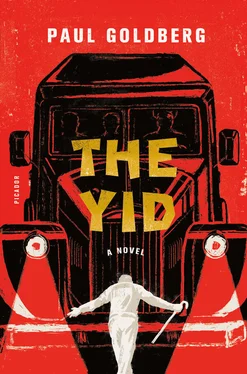To chase away these images, Lewis looks back at the train. He stares intensely, to escape from his memories, from his fantasies, too. This fails to produce respite. Yet, he could swear that, for an instant, he catches a glimpse of wretched, pale faces staring at him from the slowly moving cattle cars. Are they real? Is this a flash from the past? A harbinger of the future? And why is his hand caressing the handle of the pistol that once hung on the belt of Lieutenant of State Security Narsultan Sadykov?
* * *
After the freight train crawls out of sight, three men cross the railroad tracks. Within minutes, they stand at Kuznets’s unpainted picket fence. Smoke is rising from the chimney.
Kogan knocks, then knocks again.
“Maybe he is hard of hearing,” says Levinson.
Kogan pushes the door. The doorjamb is shattered, the wood splintered.
“Reb Kuznets…,” says Kogan from the threshold.
Inside, Kuznets’s meager, principally black wardrobe is strewn about the room. The drawer of the kitchen table is opened, its contents dumped out.
A stack of firewood lies next to the stove.
Kuznets hangs head-down off a large hook on the wall. Ribs protrude through the tight skin of his slight body, and wide red stripes run from his shoulders to his belly.
“Fascists,” says Kogan, lifting Kuznets’s hand.
There is no pulse, just cold, eternal stillness.
“He’s been dead for an hour, give or take,” says Kogan. “Note the long, wide burn marks on the torso. Looks like they used a fire poker. It’s a quaint folk torture method. Drag a poker along the skin slowly.”
Atop a pile of Kuznets’s belongings, Lewis notices a thin leather belt. He bends down and pulls.
The belt is over a meter in length. Attached to its other end is a half-broken, empty leather box. Next to it, Lewis finds another, similarly mutilated box.
“Tefillin?” he asks.
Kogan nods.
“Why would anyone gut tefillin?” he asks.
“Who do you think killed him?” asks Levinson. “State Security?”
“No, they’d do it in their own lair,” says Moisey Semyonovich. “This is neighbors.”
“Why?” asks Lewis.
“They may have thought the old man had gold,” says Kogan calmly. “Or dollars. And who would catch them?”
“Maybe it has begun,” suggests Lewis.
“Maybe it has,” says Kogan, bending down to close Kuznets’s eyes.
“Levinson, do you still remember the Kaddish?”
“I do, but I don’t say it,” says Levinson.
“And you, Moisey?”
“Never.”
“Am I asking you to read Mein Kamf ?” asks Kogan. “It’s for him, not for you. Shmoks … Yisgadal veyiskadash shmey rabo…”
He pauses, realizing that someone is saying the words of the prayer for the dead with him. He nods at Lewis with admiration, and the two continue:
“beolmo di vro khirusey…”
A self-described atheist, Lewis is not at all interested in Jewish religious observance. However, before the war, someone gave him a record of Robeson’s version of “Rabbi Levi Yitzchak Kaddish,” a song loosely inspired by a great Hasidic master, which contained the opening of the prayer for the dead. A few years later, after receiving a pokhoronka , a yellow scrap of paper informing him that his wife, Tatyana Abramovna Lewis, fought bravely in the Second Shock Army and was killed in the vicinity of Vereya, a colleague volunteered to transcribe the entire prayer in Russian transliteration.
The colleague was not at all religious, either.
He was a young engineer who understood instinctively that expressions of respect for the dead constituted a weapon against Fascism. Though Lewis made no effort to memorize that prayer or to learn its meaning, the unfamiliar words made a permanent home within his memory.
Strapping his leather boots into the ski bindings provokes a complex response in Lewis. It is double-edged patriotism. Like Lewis, the skis are American, and, again like Lewis, they spent the war years in the service of the Red Army.
There is more to it: America’s army is segregated, and no black man, no matter how brave and athletic, would be allowed to wear the insignia of America’s elite mountain troops. The Red Army is a disappointment, too. No longer a liberator, it stands poised to conduct massive roundups that will sweep up the people who so cheerfully and unconditionally accepted Lewis as one of their own.
What is he now? Still the Moor of World Revolution?
On his twenty-second year in the USSR, Lewis is embroiled in an entirely different struggle. The enemy’s face is before him, and it is unmistakably Fascist.
“A buffalo soldier,” he says to himself as he takes a turn toward the workers’ barracks by the railroad station. Indeed, he has become a buffalo soldier in a fight against Fascism. How did the earth’s political polarity flip so completely in so brief a time? Were battles lost along the way? Was he, Friederich Robertovich Lewis, hiding in Siberia as those battles were lost?
Kima waits by the side of the road. He nods to greet her without interrupting the pace. She slides into the track behind him. They move silently for half a kilometer to the railroad crossing. This is the most direct route to the Kratovo depot six kilometers away.
Along the way, they will pass spare spurs, taking the opportunity to analyze the composition of waiting trains.
Levinson’s order is clear: stay in the shadows. The pistol in Lewis’s pocket is to be used only in extreme peril.
“No more night guards,” Levinson said, handing him the revolver. “And control her.”
That will be difficult, Lewis realizes, casting glances at the girl. He understands her a little better now, and, gliding swiftly under the stars, he extrapolates the rest.
He has seen many women like her. Her kind volunteers to do the most physically challenging, most dangerous work. These Kimas dig frozen dirt in Magnitogorsk, lay railroad tracks through the tundra, and carry explosives behind enemy lines. Lewis knows the type in more intimate situations as well. These women don’t fuck you. They take you on for reasons other than the pursuit of pleasure. Their objective is to outwit, overpower, outman, and, leaving you for dead, disappear into the forest.
The girl is on his heels now, pushing him to speed up. And another thing about Kimas: they are programmed for self-sacrifice. For her kind, survival can only be accidental.
Tatyana was more complicated. Most of the time, she was actually a woman, not a would-be man in a skirt. But in the end, the inner Kima won, and Tatyana was, as a consequence, gone, blown to bits in a swamp. Lewis volunteered for the war as well, but he wasn’t born to be a soldier. He is a maker of things, not their destroyer, and he was relieved to hear his new motherland politely decline his kind offer of self-sacrifice. His place was in the Ural, on the production front.
* * *
They follow in the tracks of a truck that passed a few hours earlier.
The girl is alongside him now, setting the pace effortlessly, just a touch beyond his comfort level. He is starting to run out of breath. This is a race between the sexes, her game.
“Another kilometer to the spur,” she says. “At this rate, we’ll see another train before we get there.” There is a soldierly efficiency about her.
Heading away from Moscow, toward Kratovo, Kima and Lewis cast glances to the left, toward the railroad.
A student of the train schedule, Kima knows exactly when to expect the next Moscow-bound train. Lewis realizes it as well. In the moonlit night, they see an approaching aura of lights, the steam rising above the horizon. They move forward, pondering the same questions: Will it be made up of freight cars? Will there be tank cars? Platforms? Will passenger cars be mixed in as well? Will the locomotive be a Sergo Ordzhonikidze or an Iosif Stalin?
Читать дальше












